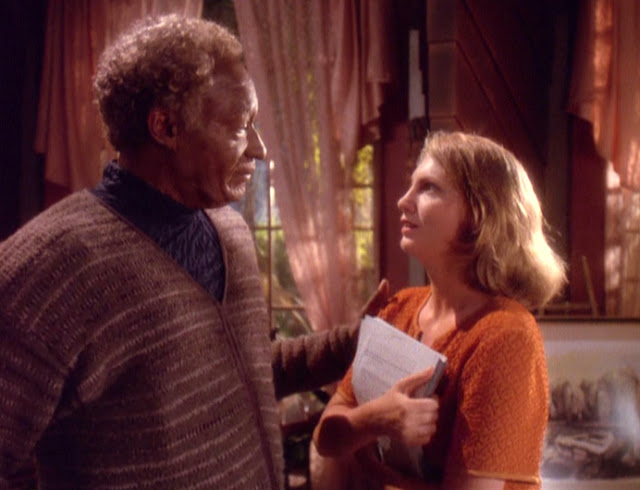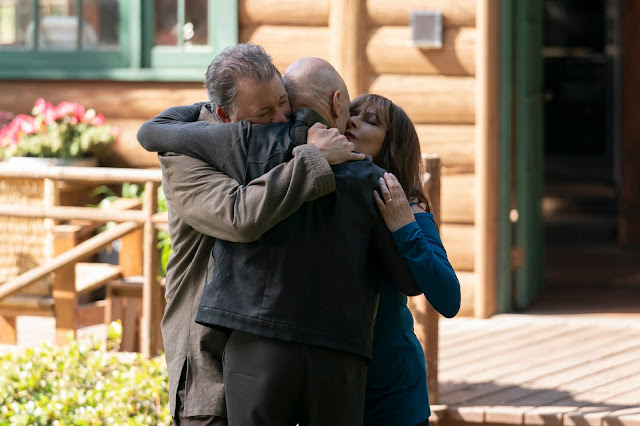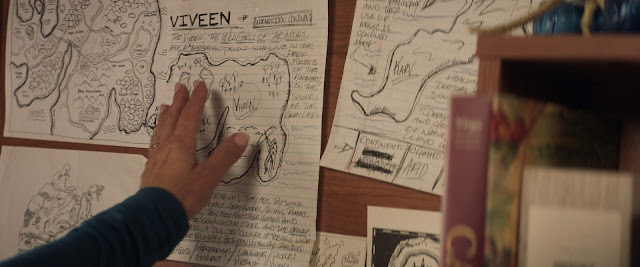We’re not sure at first what century we’re in. Rain falls at night on the windows of a warm, cozy home. The score is gentle, haunting and ineffably sad. The camera pans in close up across a desk, past clearly personal objects: an African sculpture, a small framed photo of Ben and Jake Sisko together, and an old man’s hand gently clasps what we recognise as Ben’s baseball. Already, we’re in a space, an inner experience, of deep loss and sadness. These few moments immediately set the episode’s tone of grief in a way that is virtually unique in Star Trek.
“The Visitor” is, for me as for many others, a deeply personal episode to write about. In a way, I’m not sure why, because I’ve not yet experienced a major bereavement - though I have had big losses, and maybe that makes the episode even more universal, as almost everyone suffers those. “The Visitor” is written by Michael Taylor, then new to DS9’s writing team but going on to write other impressive and moving episodes, including a fair number for Ronald D Moore’s magnificent reimagining of Battlestar Galactica. (Of those, “Unfinished Business” stands out for me. Curiously, it similarly keeps flashing back to the past and ends with a deeply felt embrace and an affirmation of two people’s love, just like “The Visitor” does.)
The difficulty of writing about an episode like this one is putting my thoughts into words. “The Visitor” already expresses so beautifully what it wants to say, in large part through metaphor and also the performances, the direction, the score, the whole production. It’s a short film, a short story, a poem and a piece of music. Attempting to “analyse” it therefore runs the risk of trivialising it. So I wouldn’t blame anyone who loves this episode from steering clear of my piece altogether. I’m aware that anything I say can barely approximate what “The Visitor” is “saying”; the extent to which so many of us are deeply moved by it shows that we get it, even if we can’t (adequately) put it into words.
Still, I try to write about what I love, or at least attempt to find positives in things I like less. And the more I love a story, the more I tend to think about it. And if it’s Star Trek, I want to share those thoughts with my friends in the fan community. So I’ll try, but really I’m just affirming what I think is already there, in the episode. Because I love it.
Though very intimate, the story has huge implications for DS9’s mythology, and (typically for the series) some very grey ethical considerations. The title itself is ambiguous. For there are two visitors in this story: Ben Sisko, who is trapped in subspace but appears to Jake at brief intervals through his son’s life; and Melanie, a lover of Jake’s writing and an aspiring writer herself, who turns up at Jake’s house ostensibly seeking shelter from the rain. Melanie is a one-off character of course, but a uniquely memorable one. If Jake hadn’t changed the timeline at the end, I’m certain he would never have forgotten her.
Melanie may be soaking wet when she arrives, but the performance by Rachel Robinson is radiant. She captures the hero worship of a wide-eyed fan perfectly, but as Jake tells his story she becomes something more. She listens attentively, hangs on every word, and is full of empathy and kindness. The warm light in Jake’s room emphasises this, picking out her orange sweater and blonde hair. Melanie is almost naively open and trusting; she feels utterly safe with Jake, and she wants to hear his story with as much attention as she read his work. Even so, had she arrived on any other night, Jake says he wouldn’t have agreed to her request. This is his last and only chance to tell someone his life’s story, before it is lost forever.
Jake’s life was forever changed not just by his father’s apparent death, but by the fact that he’s still alive and keeps returning to Jake for moments that are all too brief. Each time this happens, it breaks Jake’s heart once again, finally leading him to give up writing to focus on the scientific problem of how to get his father back. His obsession leads to him losing his wife. On a recent episode of Snap Trek (one of my favourite podcasts!) Jenn Tifft made the point that Sisko’s returns are a perfect metaphor for grieving. Jake finds it impossible to live with grief because his father is trapped and keeps returning, reminding Jake of his absence. In real life, the problem of bereavement is the struggle to move on; the bereaved can’t escape the loss of the loved one. Sometimes this can even be a comfort, when people sense that the beloved is always with them, watching over them in some way. But not for Jake.
Jake goes so far with this that he’s ultimately willing to change the timeline, to save his father and his younger self. Jake’s apparently wasted life as well as his success in altering the fates of countless people (in retrospect, only we can imagine the scale of this), has led some to describe “The Visitor” as a tragedy. Perhaps it is, even though we know that for the sake of the story Jake has to succeed. It’s certainly heartbreaking, although each time I watch it the feeling I’m left with is mostly of warmth and love. But it’s love of such intensity that it’s almost frightening. (Future Odo also changes the timeline for his and Kira’s sake in “Children of Time”, and the horrified Kira cries, “and that [his love] makes it right?!”) The consequences of Jake’s actions are impossible to measure.
They do, however, have the (for me) heartbreaking effect of wiping from existence the events we’ve spent the whole episode being so moved by - including Jake’s beautiful encounter with Melanie. What happens to Melanie after Jake alters the timeline? Is she even born? And when, unforgettably, she kisses Jake goodbye, does she realise that that’s a possibility? Somehow, I hope she does, because it would mean that having seen the depth of Jake’s grief, she accepts it. This would be love and compassion to the nth degree.
But it also renders Jake’s lovely parting words with Melanie (almost) meaningless. For neither he or she will ever remember them. For me, this is the most painful implication of the story. It’s almost as if he is knowingly cheating her. Is this a flaw in the episode’s writing? I honestly don’t know, because Michael Taylor is a wonderful writer, and I’m not. Perhaps it’s just another of those deep ambiguities so typical of DS9, which keep you thinking long after the episode is finished. You can keep mulling it over and over, and never come to a definite conclusion.
Certainly, the consequences of Jake’s actions reflect a classic, frequently recurring dilemma in Star Trek. Usually, Star Trek leaves the distinct impression that the needs of the many outweigh the needs of the one. I have this feeling even in episodes which severely test or question the famous Vulcan maxim, such as “Damage” or “In the Pale Moonlight”. But in the third Star Trek film, Kirk’s love for Spock leads him to insist that the needs of the one outweigh the needs of the many. And in “The Visitor”, Jake appears to believe the same.
Normally I would be horrified by the consequences this leads to. How many people’s lives are changed, how many die, because Jake changes the timeline? What right does he have to do this? Yet my response to the ending is always ambivalent. I feel loss, knowing that the future has been changed, yet also warmth and gratitude because Ben and the teenage Jake are both saved. And we know that the story has to be resolved, and the only way to resolve it is to sweep it away, as if it had never happened.
I can’t remember how I felt when I saw this episode the first time. But surely, knowing the end of the series’ epic story does change how we feel about it. For Sisko has a destiny, one which will lead to many deaths but also potentially save trillions of lives (considering what we later learn of the Pagh Wraiths’ intentions). The Prophets know that destiny; existing outside linear time, they’ve “already” seen it. So it has to happen, but Ben is incapable of fulfilling that destiny until Jake snaps the cord.
And Sisko remembers. Like Picard at the end of “All Good Things…”, he’s the only one who does, and the implications of that must be huge for his relationship with Jake. He knows, to an extent that he couldn’t have done before, just how much his son loves him… and needs him. It also shows that although the future timeline is wiped from existence, it did still exist. Because otherwise, as T’Pol comments at the end of Enterprise’s “E2”, “why would we remember them?”
I love Star Trek when it asks profound human or even metaphysical questions and them leaves them unanswered. Is Data human after all, and what does “human” mean anyway? Did Picard really die, and is he still “human” afterwards? Are Moriarty, the Doctor, and Vic Fontaine truly sentient, and if they are, how did they become so? How can a hologram gaze at Nog with such compassion and then answer with such deep human understanding, so that I don’t believe him when he claims he’s “as hollow as a snare drum”?
And who is Melanie? On the one hand, she’s a wonderful narrative “device”: the creation of a storyteller writing about a storyteller who is literally telling her the story of his life. But I sometimes have an uncanny feeling about her, almost as if she’s a kind of angelic visitor (maybe without knowing it, like Kara in Battlestar Galactica). I’m not suggesting that she’s literally one of the Prophets, come to guide and comfort Jake, letting him experience a tiny piece of life and connection in his last hours. It’s just a feeling, and despite her radiant attention she remains a real and relatively inexperienced human being. She’s a true character, not a god. Perhaps it’s just another aspect of the story that remains mysterious - part of what makes it so uniquely and complexly moving.
At its core, however, the episode is gently but insistently suggesting something else to us. It almost contradicts the story’s implication that Jake “has to” change the timeline, both to show us the depth of his love for his father and to fulfil the destiny story that the rest of DS9’s mythology tells. And I think it’s the main reason why this episode affects me so personally, and makes me feel a little sadder each time I see it. This theme is that of the “unlived life”.
……………………………………………………………..
At the beginning of old Jake’s story to Melanie, teenage Jake is struggling, endlessly reworking a short story. Decades later, having eventually learned to live with his father’s loss, he’s a successful writer working tirelessly on a new novel; but his wife still has to remind him of her presence in his life. But then his father reappears briefly, retriggering Jake’s trauma, and after learning the reason for these visitations Jake gives up writing and begins to study subspace mechanics, searching obsessively for a way to free his father. This obsession leads to separation from his wife; he’s not paying attention to the life and people surrounding him. After failing to bring Ben back and knowing that he won’t return for many years, he eventually returns to writing. But only because he knows that there is a way after all, but that it won’t be possible until he’s an old man, coinciding with Ben’s next visitation.
The theme rings clearly through the layers of moral greyness, imaginary future science, metaphysical ambiguity, moments of connection with others, and even the ever present sense of grief and loss (expressed so movingly by the actors, especially Tony Todd and Cirroc Lofton as Jake). It’s there in the dialogue, repeatedly through the episode - such as when Jake first sits down with Melanie after bringing her tea:
“There's only one first time for everything, isn't there? And only one last time too. You think about such things when you get to be my age; that today may be the last time you sit in your favorite chair, or watch the rain fall, or enjoy a cup of tea by a warm fire.”
It’s there, heartbreakingly, when Jake meets his father in subspace:
“I'm proud of what you've accomplished.”
“None of it matters - now that I know that you're out there lost somewhere.”
“Of course it matters. You have a wife; a career. And don't think because I'm not around much, that I... don't want grandchildren!”
And it’s spoken most clearly twice, first by Sisko to his teenage son on the Defiant and then echoed many years later by Jake as he says goodbye to Melanie:
“I... want you to promise me something.”
“Anything!”
“While you're studying my stories, poke your head up every once in a while. Take a look around. See what's going on. It's life, Melanie.”
“And you can miss it if you don't open your eyes.”
It’s a tragedy after all, at least on one level. Jake has wasted his life, and he has to wipe the timeline from existence to restore what might have been. In science fiction this is possible, but in real life? We only get one chance. And this is what makes me grieve after seeing this episode. I really take Jake’s final advice to heart, every time. Maybe especially this time.
So here’s a brief story of my own - not with the intention to self pity, but because “The Visitor” has an exceptionally personal resonance for me. I spent much of my adult life drifting, never sure of myself in any way, whether in relationships or work. After several years of finding happiness and fulfilment in my mid thirties, I was struck by a chronic illness which I still have, seventeen years later. It hasn’t all been bad; my partner and I have had some good experiences together, within limits imposed by my health. There have also been some very bad times, physically and mentally - but no worse than those experienced by many millions of other people.
I am aware though, that there’s an unlived life. In science fictional terms, a timeline that might have been if I hadn’t become chronically ill. I don’t believe that I’ve ever truly grieved for this, or moved on from it. I’ve learned to live with it, manage it, but also to avoid and distract myself from it. I can always find things that I love: music, reading, the internet… The imaginary future of Star Trek. And in the past few years, for complex reasons that have been exacerbated (as for so many other people) by the Covid-19 pandemic, I’ve been living even less than I was five or ten years ago.
For this reason, “The Visitor” affects me more deeply with the passing years - and it feels sadder than it used to. I haven’t yet lost my dad, or my mum, or anyone truly close to me through bereavement - though that very nearly changed seven years ago when my partner almost died in ICU. But all of us have lost something, and for me, the biggest and deepest one is the unlived life.
I know this is something I have to deal with, and having just watched “The Visitor” again I’m determined to work on it. Jake’s advice to Melanie can act as a wake up call, just as other episodes of Star Trek have helped others in profound ways, sometimes even literally saving lives. Chronic illness always means baby steps, but enough baby steps add up to something. Even ten minutes on the front steps of my house, catching the evening sun, is not nothing. And while the pandemic currently complicates things, three years ago my partner and I were in the Italian Alps! (I’ve been in love with mountains for decades now.)
But… the sadness is there - and in one of Star Trek’s greatest episodes too. In the end, “The Visitor”’s deceptively simple and intimate story hides a wealth of complexity in plain sight. And part of that complexity, along with its moral greyness and almost metaphysical questions, lies in its contradictions. It has a happy ending, and yet an indescribably sad one. It’s a tragedy, yet it leaves you with a unique sense of love, loss, warmth and human connection. It’s not a story that could be told in realist fiction, because it couldn’t be possible in our real world. But as the kind of story that Kim Stanley Robinson calls “fantastika”, it can act as a mirror for the contradictions and complexities at the heart of human life and sentient existence. In this story, a bereaved teenager can, many decades later, bring his father back to life, both wasting his life and at the same time recreating what could have been.
“Jake - you didn't have to do this. Not for me.”
“For you, and for the boy that I was. He needs you, more than you know. Don't you see? We're going to get a second... chance.”
Only in science fiction!























